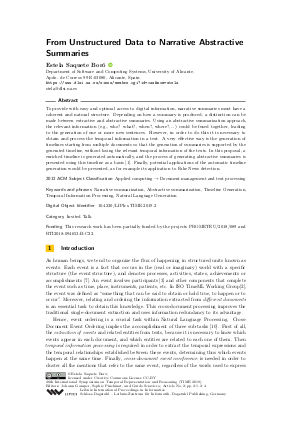From Unstructured Data to Narrative Abstractive Summaries (Invited Talk)
Author
Estela Saquete Boró 
-
Part of:
Volume:
26th International Symposium on Temporal Representation and Reasoning (TIME 2019)
Part of: Series: Leibniz International Proceedings in Informatics (LIPIcs)
Part of: Conference: International Symposium on Temporal Representation and Reasoning (TIME) - License:
 Creative Commons Attribution 3.0 Unported license
Creative Commons Attribution 3.0 Unported license
- Publication Date: 2019-10-07
File

PDF
LIPIcs.TIME.2019.2.pdf
- Filesize: 324 kB
- 4 pages
Document Identifiers
Subject Classification
ACM Subject Classification
- Applied computing → Document management and text processing
Keywords
- Narrative summarization
- Abstractive summarization
- Timeline Generation
- Temporal Information Processing
- Natural Language Generation
Metrics
- Access Statistics
-
Total Accesses (updated on a weekly basis)
0PDF Downloads0Metadata Views
Abstract
To provide with easy and optimal access to digital information, narrative summaries must have a coherent and natural structure. Depending on how a summary is produced, a distinction can be made between extractive and abstractive summaries. Using an abstractive summarization approach, the relevant information (e.g., who? what?, when?, where?,...) could be fused together, leading to the generation of one or more new sentences. However, in order to do this it is necessary to obtain and process the temporal information in a text. A very effective way is the generation of timelines starting from multiple documents so that the generation of summaries is supported by the generated timeline, without losing the relevant temporal information of the texts. In this proposal, a enriched timeline is generated automatically, and the process of generating abstractive summaries is presented using this timeline as a basis [Barros et al., 2019]. Finally, potential applications of the automatic timeline generation would be presented, as for example its application to Fake News detection.
Cite As Get BibTex
Estela Saquete Boró. From Unstructured Data to Narrative Abstractive Summaries (Invited Talk). In 26th International Symposium on Temporal Representation and Reasoning (TIME 2019). Leibniz International Proceedings in Informatics (LIPIcs), Volume 147, pp. 2:1-2:4, Schloss Dagstuhl – Leibniz-Zentrum für Informatik (2019)
https://doi.org/10.4230/LIPIcs.TIME.2019.2
BibTex
@InProceedings{saqueteboro:LIPIcs.TIME.2019.2,
author = {Saquete Bor\'{o}, Estela},
title = {{From Unstructured Data to Narrative Abstractive Summaries}},
booktitle = {26th International Symposium on Temporal Representation and Reasoning (TIME 2019)},
pages = {2:1--2:4},
series = {Leibniz International Proceedings in Informatics (LIPIcs)},
ISBN = {978-3-95977-127-6},
ISSN = {1868-8969},
year = {2019},
volume = {147},
editor = {Gamper, Johann and Pinchinat, Sophie and Sciavicco, Guido},
publisher = {Schloss Dagstuhl -- Leibniz-Zentrum f{\"u}r Informatik},
address = {Dagstuhl, Germany},
URL = {https://drops.dagstuhl.de/entities/document/10.4230/LIPIcs.TIME.2019.2},
URN = {urn:nbn:de:0030-drops-113608},
doi = {10.4230/LIPIcs.TIME.2019.2},
annote = {Keywords: Narrative summarization, Abstractive summarization, Timeline Generation, Temporal Information Processing, Natural Language Generation}
}
Author Details
Funding
This research work has been partially funded by the projects PROMETEU/2018/089 and RTI2018-094653-B-C22.
References
- Cristina Barros, Elena Lloret, Estela Saquete, and Borja Navarro-Colorado. NATSUM: Narrative abstractive summarization through cross-document timeline generation. Information Processing & Management, February 2019. URL: https://doi.org/10.1016/j.ipm.2019.02.010.
- ISO TimeML Working Group. ISO TimeML TC37 draft international standard DIS 24617-1, 2008. URL: http://semantic-annotation.uvt.nl/ISO-TimeML-08-13-2008-vankiyong.pdf.
-
Heng Ji, Ralph Grishman, Zheng Chen, and Prashant Gupta. Cross-document Event Extraction and Tracking: Task, Evaluation, Techniques and Challenges. In RANLP, pages 166-172. RANLP 2009 Organising Committee / ACL, 2009.

-
Hector Llorens, Estela Saquete, and Borja Navarro-Colorado. Applying Semantic Knowledge to the Automatic Processing of Temporal Expressions and Events in Natural Language. Information Processing & Management, 49(1):179-197, 2013.

- Elena Lloret and Manuel Palomar. Text Summarisation in Progress: A Literature Review. Artif. Intell. Rev., 37(1):1-41, January 2012. URL: https://doi.org/10.1007/s10462-011-9216-z.
-
Inderjeet Mani and Mark T. Maybury, editors. Advances in Automatic Text Summarization. MIT Press, Cambridge, MA, USA, 1999.

-
Inderjeet Mani, James Pustejovsky, and Robert Gaizauskas. The Language of Time. Oxford University Press, Oxford, 2005.

-
Anne-Lyse Minard, Manuela Speranza, Ruben Urizar, Begoña Altuna, Marieke van Erp, Anneleen Schoen, and Chantal van Son. MEANTIME, the NewsReader Multilingual Event and Time Corpus. In Proceedings of the Tenth International Conference on Language Resources and Evaluation (LREC 2016), May 2016.

-
Jeff Mitchell and Mirella Lapata. Composition in Distributional Models of Semantics. Cognitive Science, 34:1388-1429, 2010.

-
Borja Navarro and Estela Saquete. GPLSIUA: Combining Temporal Information and Topic Modeling for Cross-Document Event Ordering. In Proceedings of the 9th International Workshop on Semantic Evaluation (SemEval 2015), pages 820-824, Denver, Colorado, June 2015. Association for Computational Linguistics.

- Borja Navarro-Colorado and Estela Saquete. Cross-document Event Ordering Through Temporal, Lexical and Distributional Knowledge. Know.-Based Syst., 110(C):244-254, October 2016. URL: https://doi.org/10.1016/j.knosys.2016.07.032.
